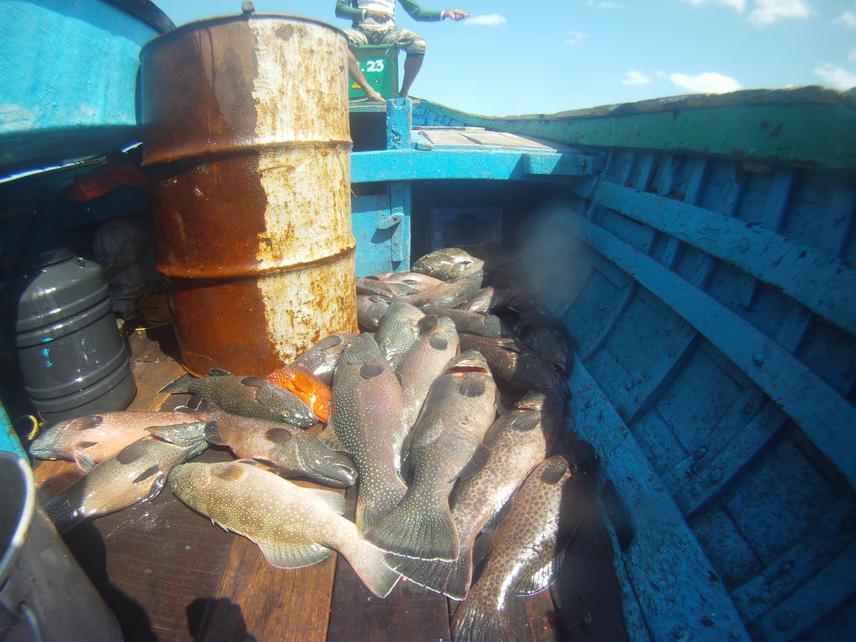Rucha Karkarey
Other projects
19 Nov 2010
Assessing the Effects of Mass Coral Bleaching on an Apex Predator Guild (Groupers) of the Lakshadweep Islands
3 Sep 2012
Conserving Top Benthic Predators in the Lakshadweep Reefs: Identifying Priority Areas for Grouper Conservation and Ecosystem Functioning
3 Feb 2015
Coping Mechanisms and the Vulnerability of a Keystone Reef Predator (Peacock Hind, Cephalopholis argus) to Climate-Change in Lakshadweep.
Commercial fisheries in Lakshadweep are transitioning from a predominantly offshore-tuna to near-shore reef fishery. Predatory fish like groupers (epinephelids) are at the centre of this transition. This study seeks to document changing fishing patterns across the Lakshadweep archipelago and to understand socio-economic drivers underlying this change.

A typical catch of reef fish from spawning aggregation sites.
Commercial fisheries in Lakshadweep are on the brink of a major shift from a predominantly off- shore tuna, to a near-shore reef fishery in the past five years. Ecologically important predatory fish like groupers (epinephelids), snappers (lutjanids), jacks (carangids), herbivores like parrotfish (scarids), rabbitfish (siganids) and surgeonfish (acanthurids) are at the crux of this transitioning fishery. Groupers are commercially and ecologically important reef fish, fuelling a large food fish trade in South-East Asia and maintaining critical predatory functions on coral reefs. Previous work from the Lakshadweep archipelago shows that long-lived groupers are highly susceptible to habitat degradation, even in the absence of fishing. Therefore, in the context of multiple mass-bleaching coral mortalities, which the Lakshadweep archipelago has witnessed in the last two decades, unregulated reef fisheries can have disastrous consequences for the reef ecosystem and island biosecurity. This study seeks to document changing patterns in reef fish consumption and fishing, and understand the socio-economic drivers underlying the transition from tuna to reef fish in the Lakshadweep.
The specific objectives of this survey are to:
1. Identify commercial reef fishing hotspots in the islands.
2. Quantify changes in patterns of local consumption of reef fish species in the islands.
3. Quantify growth in fishing pressure on target reef fish species over a five-year period.
4. Quantify fishing pressure on aggregating grouper species
5. Understand the social and economic drivers of transition in fisheries from tuna to reef fish.
In this study, we will use a combination of semi-structured interviews and direct observational methods for estimating fish catch.
The work of our larger programme is helping generate a vulnerability map of the archipelago based on ecological responses to climate disturbances. The current study will add an important layer of human use to this mapping exercise. Over the last few years NCF has become an important source of Ecological Knowledge to the Lakshadweep Administration and Island Community. We have been proactively engaging with fisheries management and conservation initiatives in these islands. The current study will help identify how current reef fishing pressure matches with the reef’s inherent ability to support off-take. An important aspect of the project is to engage with local stakeholders and policy makers, regarding the importance of reef fish for overall reef resilience and the sustainable management of reef fisheries.